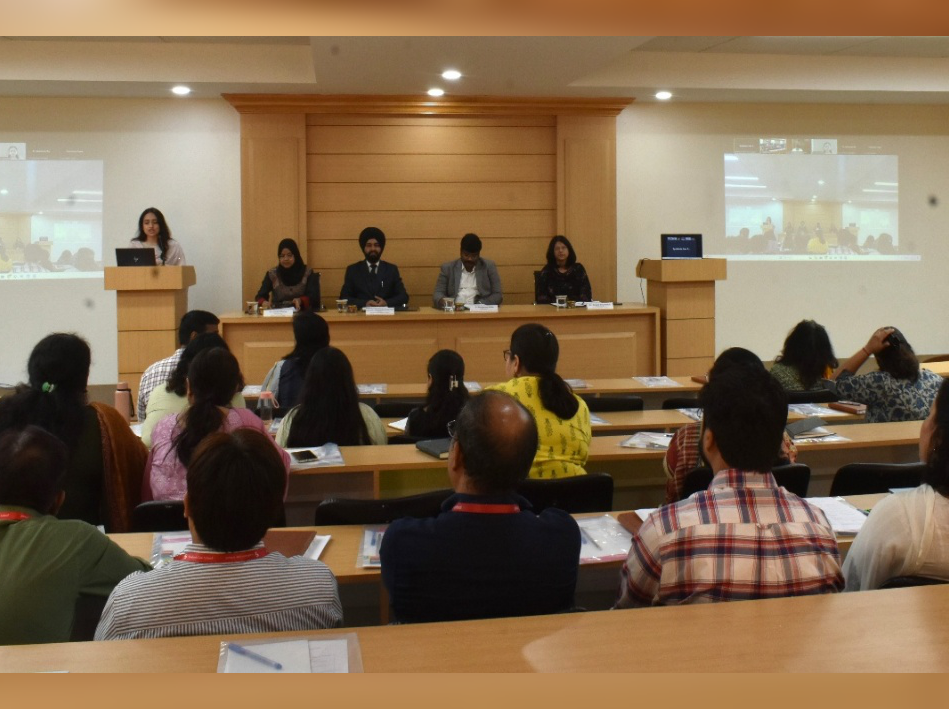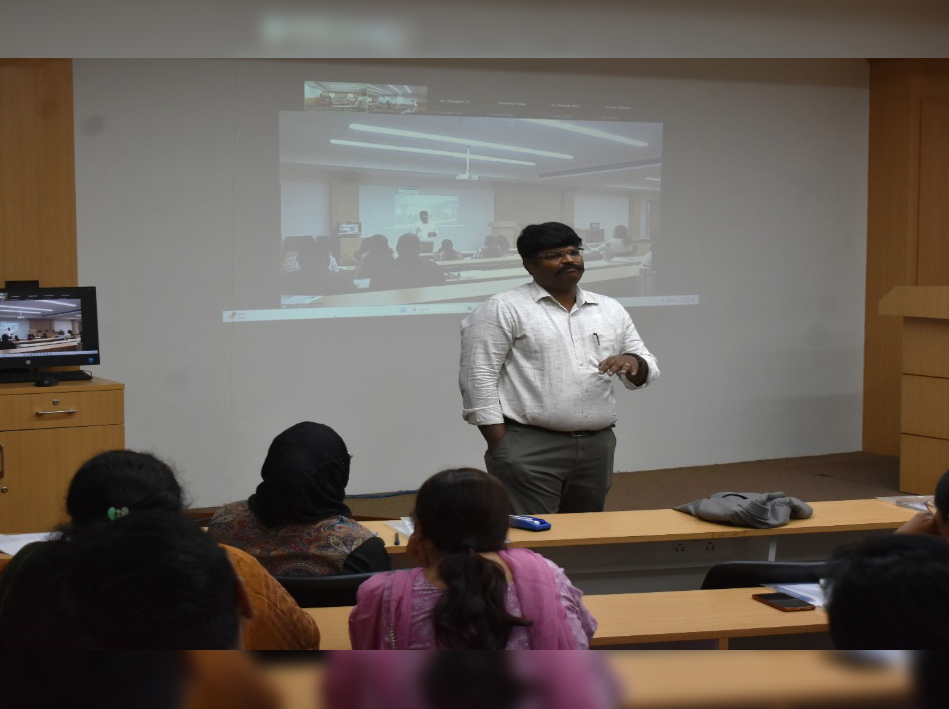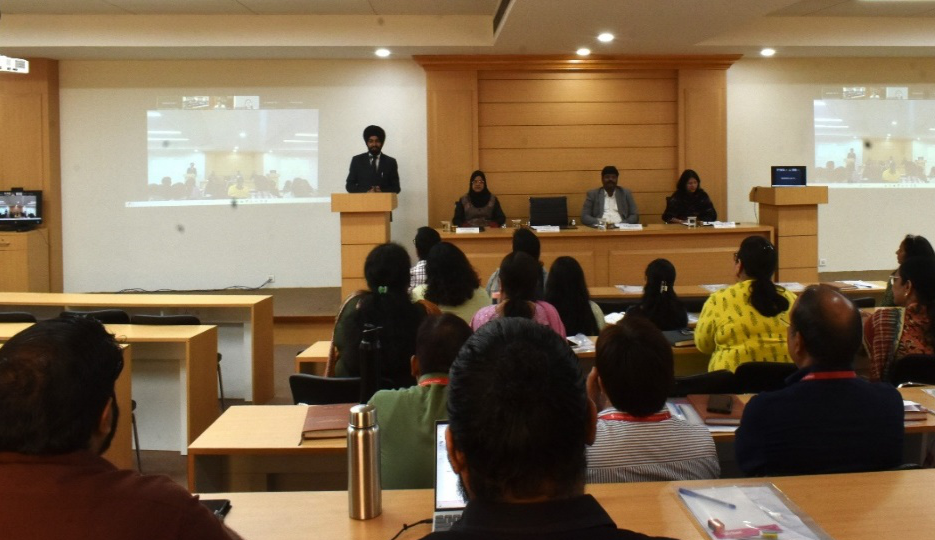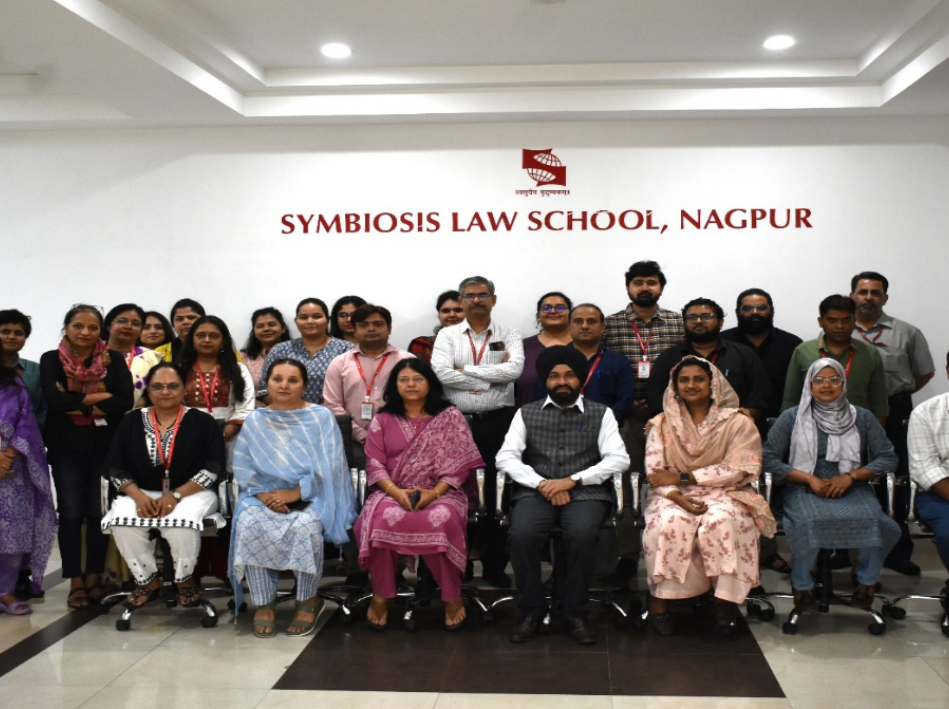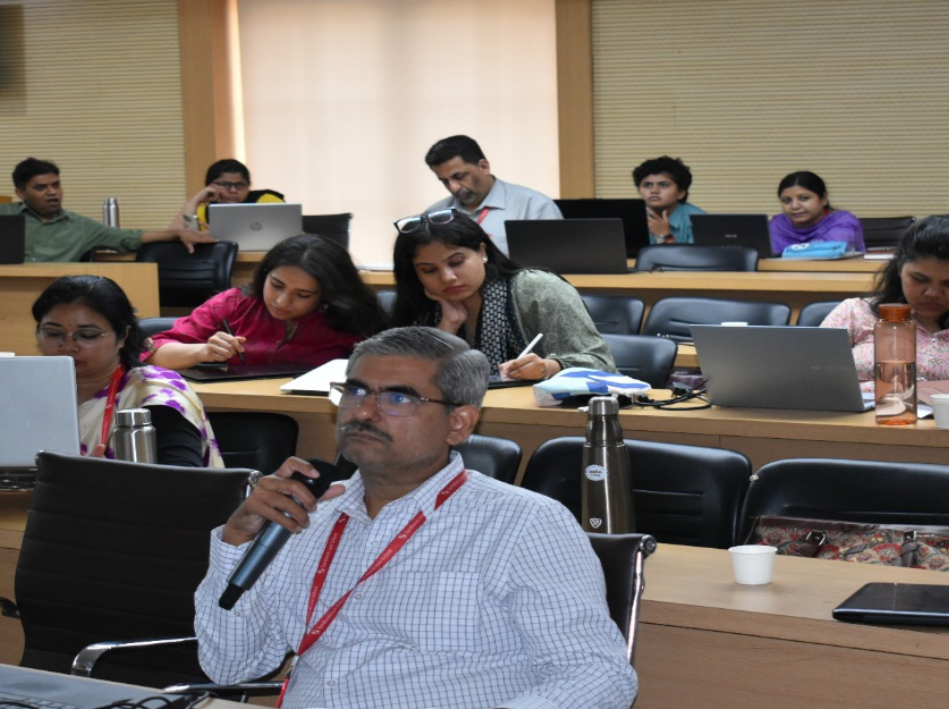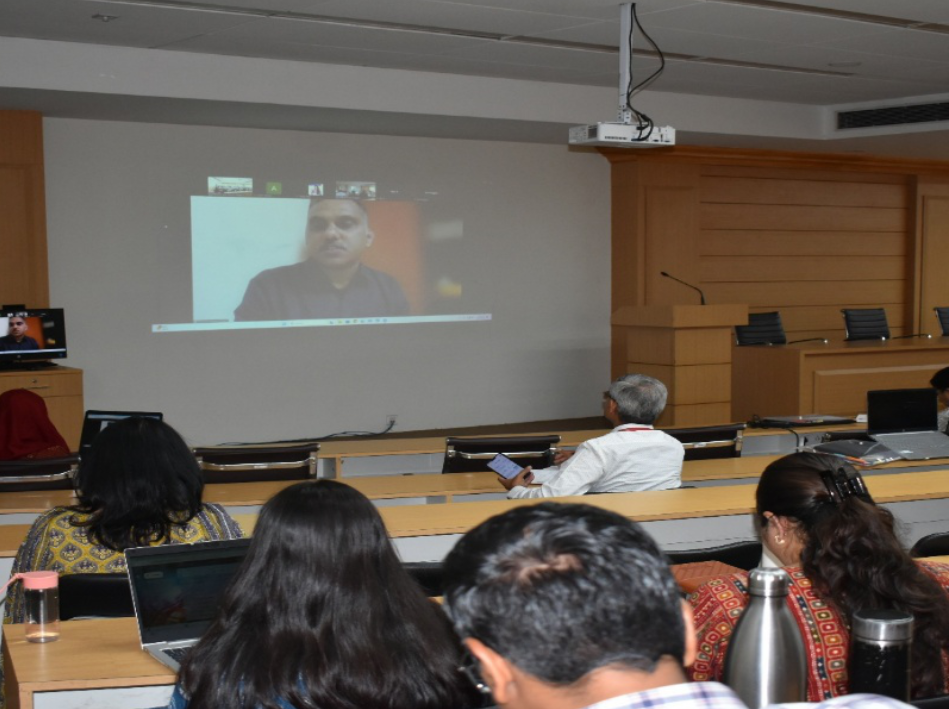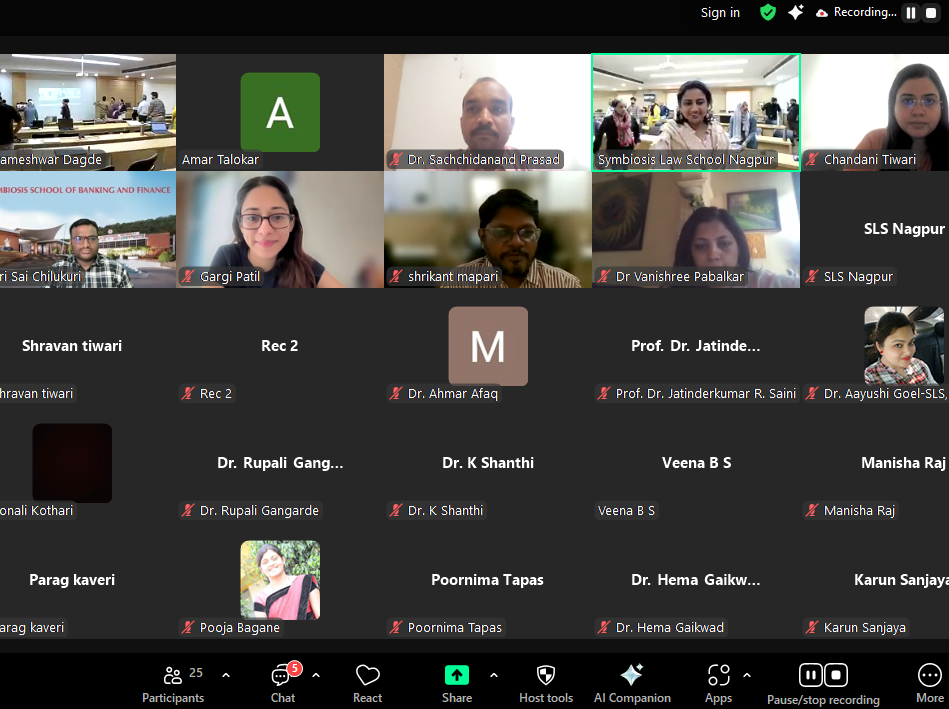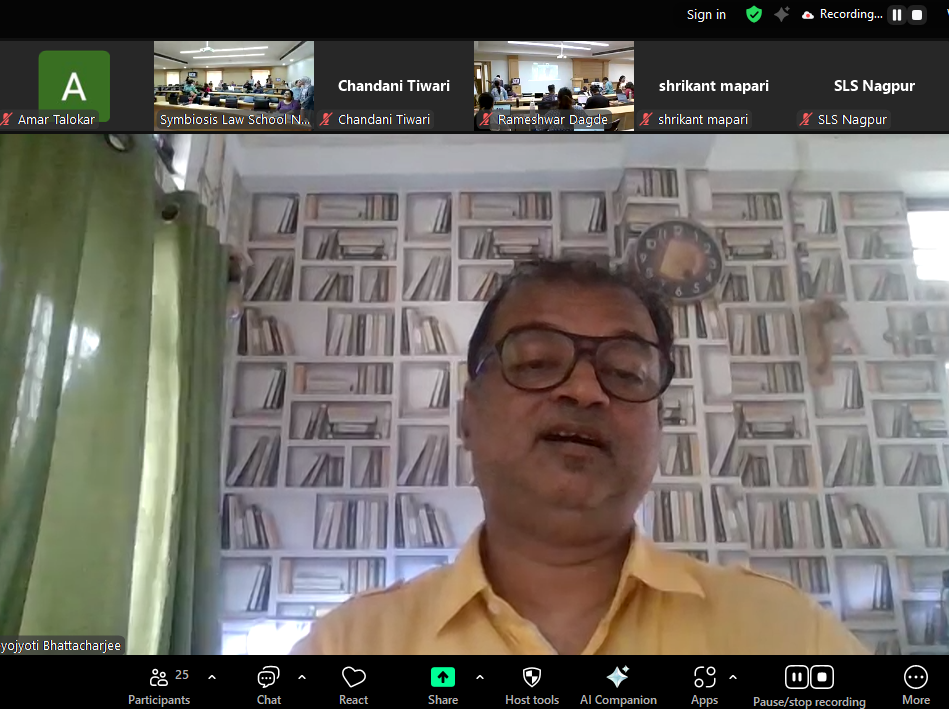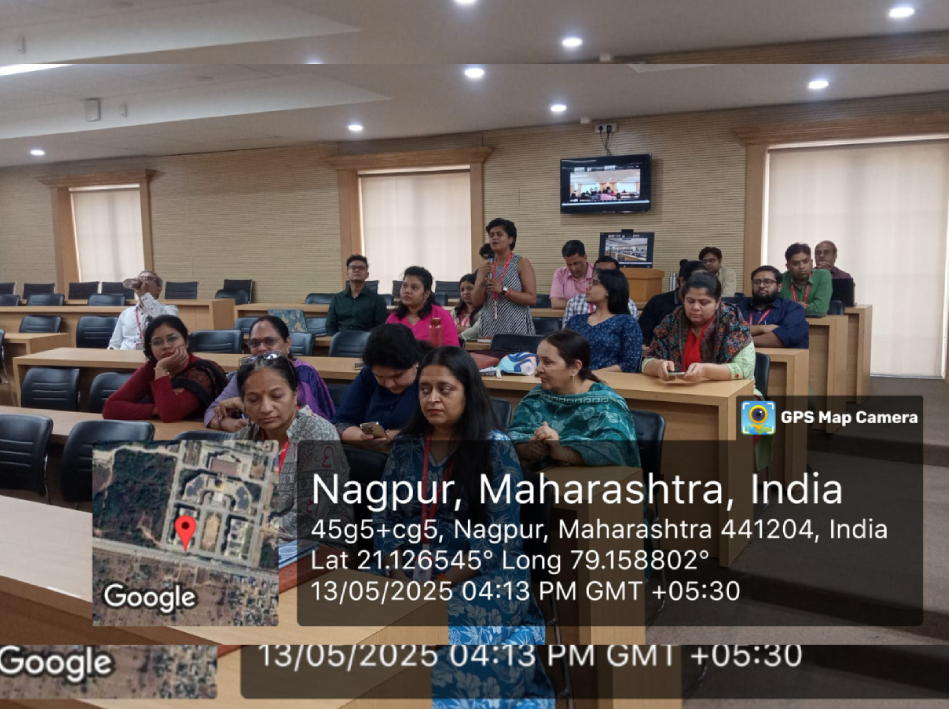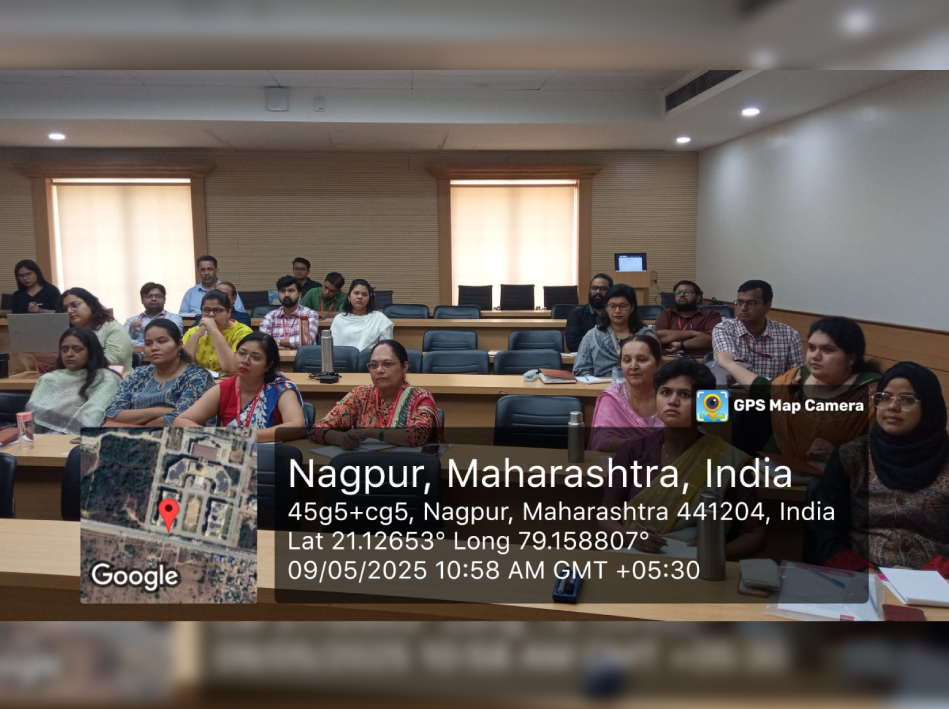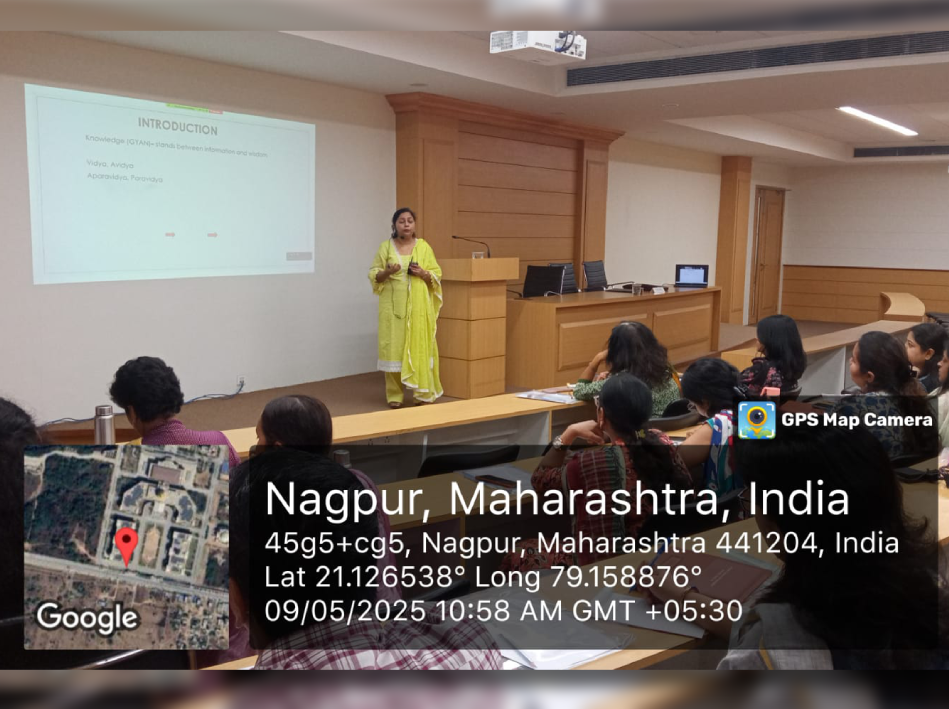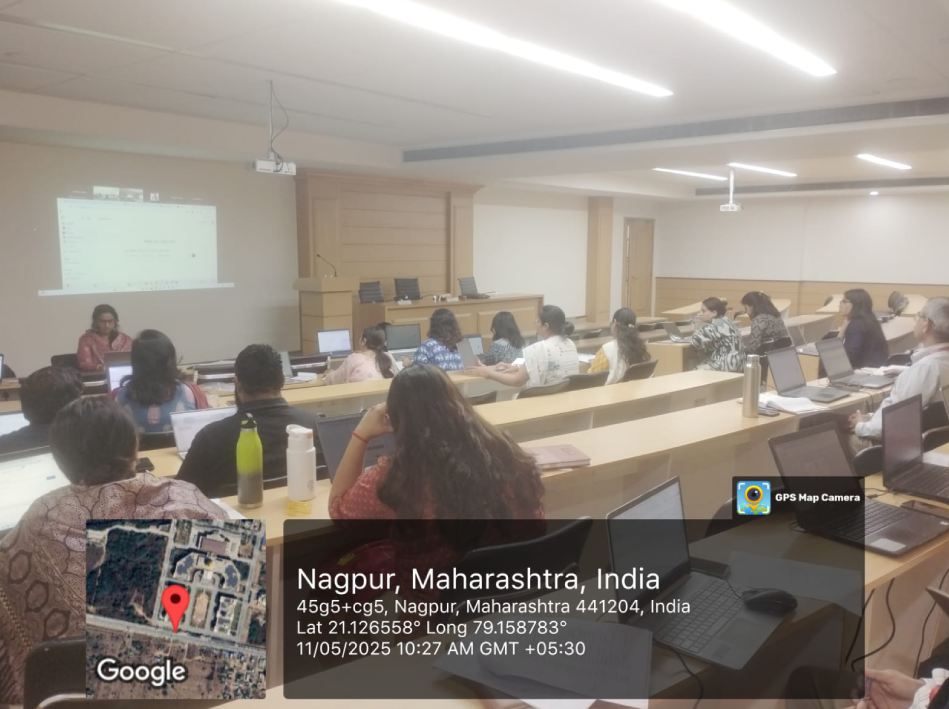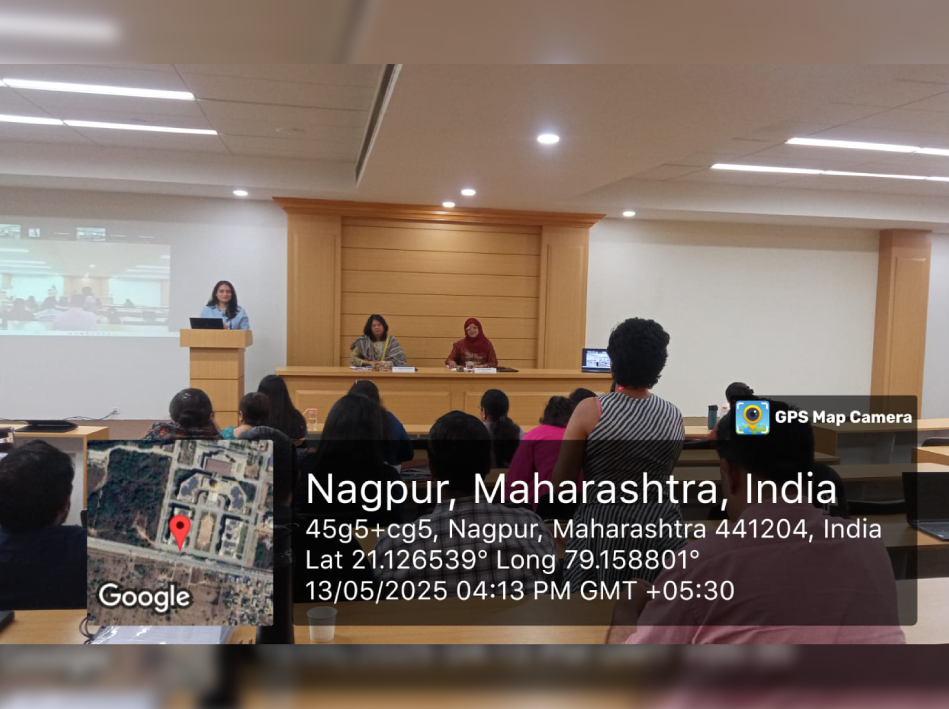Happenings
Symbiosis Law School, Nagpur in collaboration with STLRC-Pune organized a Five Day Faculty Development Program on Research Methodology for Social Sciences from May 9-13, 2025. The event was organized in hybrid mode.
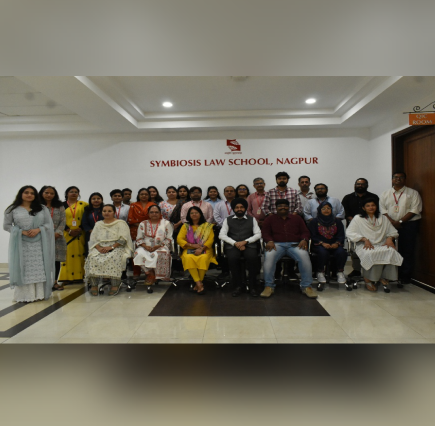
The details of the event are mentioned below-
Day 1: 9th May, 2025
Inaugural session
The Faculty Development Programme on Research Methodology for Social Sciences started with an inaugural session. The chief guest for the session was Prof. (Dr.) Manoj Kumar Sinha, VC of National Law University, Jabalpur who joined online. The other dignitaries present were Dr. Sukhvinder Singh Dari-Campus Director, Sy mbiosis International (Deemed University) Nagpur, Director-Symbiosis Law School-Nagpur, Dr. Deepti Khubalkar, Deputy Director, Symbiosis Law School, Nagpur, Dr. R. Stalin-Deputy Director, National Commission of Scheduled Castes, Govt. of India, Dr. Sophia Gaikwad, Head STLRC, Pune and Dr. Ayesha Khatun, Assistant Professor, Symbiosis Law School, Nagpur.
Session I: Introduction to Research in Social Sciences by Dr. Payal Thaorey
The session discussion revolved around the explanation on how research in social sciences involves systematic inquiry into human behaviour, society, and relationships. It aims to understand, explain, and sometimes predict social phenomena. The process is rooted in both qualitative and quantitative methodologies. It draws from disciplines like sociology, economics, political science, and anthropology. Social science research plays a vital role in shaping policies, solving societal issues, and contributing to academic knowledge.
Session II: Formulating Research Problems & Objectives by Dr. Payal Thaorey
The session highlighted that formulating a research problem is the first critical step in any research process. It involves identifying a specific issue or gap in existing knowledge that needs investigation. Clear, well-defined research problems lead to focused and meaningful studies. Research objectives are derived from the problem and outline what the study aims to achieve. Together, they guide the direction, scope, and methodology of the research.
Session III: Literature Review & Theoretical Framework by Dr. Rengamsamy Stalin
This session started after the lunch and session explained that a literature review involves critically analysing existing research to understand the current state of knowledge on a topic. It helps identify gaps, trends, and key debates relevant to the research problem. The theoretical framework provides a structured lens through which the research is interpreted. It connects the study to established theories and concepts, guiding data analysis and interpretation. Together, they form the foundation for a coherent and academically sound research study.
Session IV: Logical considerations of research by Dr. Rengamsamy Stalin
This session started with an ice breaking activity on identifying real or fake research topics and giving score to participants thereby on the basis of correct guesses. The highlight of the activity and discussion was that logical considerations in research ensure clarity, coherence, and consistency in the reasoning process. They involve applying systematic thinking to formulate hypotheses, design methodology, and interpret findings. Both inductive and deductive logic play a role in building and testing theories. Logical structuring helps avoid bias and enhances the credibility of the study. It is essential for maintaining the scientific integrity and validity of research outcomes.
Day 2: 10th May, 2025
Session I: Research process and interdisciplinary research BY Dr. Rengamsamy Stalin
The Resource Person stated that research process is a structured sequence that includes identifying a problem, reviewing literature, designing methodology, collecting and analyzing data, and drawing conclusions. It ensures systematic inquiry and credible outcomes. It was also discussed that interdisciplinary research integrates methods and perspectives from multiple fields to address complex problems. This approach fosters innovation and offers more holistic solutions. Combining disciplines enhances the depth and relevance of research in today’s interconnected world.
Session II: Socio-legal and analytical approach-public policy research by Dr. Rengamsamy Stalin
The session began with an activity with four volunteers to give their opinion on uses of social media. The activity focused on analyzing the fact that socio-legal approach examines how laws interact with society, focusing on their real-world impact. It integrates legal analysis with social science methods to understand the effectiveness and implications of policies. Analytical approaches in public policy research involve systematic evaluation of policy design, implementation, and outcomes. Together, these approaches help assess whether laws and policies achieve their intended social objectives. This blend is crucial for developing evidence-based, inclusive, and effective public policies.
Session III: Research Ethics & Plagiarism by Prof. (Dr.) Manoj Kumar Sinha
The discussion in this session happened on how research ethics ensure integrity, honesty, and respect for participants in the research process. It involves obtaining informed consent, maintaining confidentiality, and avoiding harm. Plagiarism, the unethical act of using others' work without proper credit, undermines academic credibility. Upholding ethical standards promotes trust and validity in research findings. Responsible conduct in research is essential for contributing to genuine and impactful knowledge.
Session IV: Research Design: Qualitative, Quantitative & Mixed Methods by Prof. (Dr.) Manoj Kumar Sinha
The expert explained that research design is the blueprint that guides how a study is conducted. Qualitative design explores experiences and meanings using interviews, observations, or textual analysis. Quantitative design focuses on numerical data and statistical analysis to test hypotheses. Mixed methods combine both approaches to provide a more comprehensive understanding of complex issues. Choosing the right design enhances the validity and depth of research outcomes.
Day 3: 11th May, 2025
Session I: Bibliometric analysis by Dr. Nimitha Aboobaker
Dr. Aboobaker first explained the theoretical background of the concept and then had hands on session developing bibliometric paper using VosViewer and Biblioshiny software. It was stated that Bibliometric analysis is a quantitative method used to evaluate academic literature and research output. It involves analysing publication patterns, citation counts, authorship, and journal impact. This method helps identify influential works, research trends, and collaboration networks. It is commonly used for assessing the performance of researchers, institutions, and disciplines. Bibliometric tools support strategic decision-making in research planning and evaluation.
Session II: Mixed Methods Research Design by Dr. Nimitha Aboobaker
The session explained the significance of mixed method of research. Mixed methods research design combines both qualitative and quantitative approaches in a single study. It allows researchers to explore complex problems from multiple perspectives. This design enhances the depth, validity, and reliability of findings. It is especially useful when one method alone cannot fully address the research questions. Mixed methods promote a more comprehensive and balanced understanding of the research issue.
Session III: NVivo for Qualitative Data Analysis (Hands-on Workshop) by Dr. Nimitha Aboobaker
The NVivo session provided practical training on using software tools for qualitative data analysis. Participants learned to import, organize, and code textual data such as interviews and open-ended survey responses. The session emphasized how NVivo helps identify patterns, themes, and relationships within qualitative data. It demonstrated how technology can enhance accuracy and efficiency in analysis. The hands-on experience equipped researchers with valuable skills for managing complex qualitative datasets.
Session IV: NVivo for Qualitative Data Analysis (Hands-on Workshop) by Dr. Nimitha Aboobaker
This session was practical in nature. Under the supervision of the Resource Person all the participants practiced NVivo and learnt coding and analysing qualitative data quantitatively. For this session the resource person had already shared interview scripts with the participants.Day 4: 12th May, 2025
Session I: Research Grants & Funding Opportunities by Dr. Nimitha Aboobaker
This session focused on identifying and securing research grants from national and international funding agencies. It covered how to draft effective proposals aligned with funders’ objectives and evaluation criteria. Participants learned the importance of clarity, feasibility, and impact in proposal writing. The session also highlighted common challenges and best practices in grant applications. Understanding funding opportunities empowers researchers to support and expand their academic work.
Session II: Choosing the Right Journal & Avoiding Predatory Journals by Dr. Nimitha Aboobaker
This session guided researchers on selecting appropriate journals for publishing their work. Emphasis was placed on evaluating journal credibility through indexing, impact factor, and peer-review processes. It also warned against predatory journals that charge high fees without proper editorial standards. Tools like Scopus and Web of Science were discussed for verifying journal authenticity. Publishing in reputable journals ensures academic integrity and enhances research visibility.
Session III: Sampling Techniques & Data Collection Methods by Dr. Dibyojyoti Bhattacharjee
The session explained that sampling techniques determine how participants are selected from a population, with probability methods giving every member a known chance, and non-probability methods relying on non-random selection. Common probability sampling includes random, systematic, stratified, and cluster sampling. Data collection methods gather information through primary means like surveys, interviews, and observations, or secondary sources such as documents and databases. Choosing the right sampling and data collection method is crucial for research accuracy and validity. Together, they help researchers obtain representative data to draw meaningful conclusions.
Session IV: Hypothesis Formulation & Testing by Dr. Dibyojyoti Bhattacharjee
The Professor stated that Hypothesis formulation involves creating a clear, testable statement predicting the relationship between variables. It usually consists of a null hypothesis (no effect) and an alternative hypothesis (effect exists). Hypothesis testing uses statistical methods to determine whether to reject or fail to reject the null hypothesis based on sample data. This process helps researchers make informed conclusions about their research questions. Accurate hypothesis formulation and testing ensure the validity and reliability of study results.
Day 5: 13th May, 2025
Session I: SPSS for Social Science Research (Hands-on Workshop) by Dr. Dibyojyoti Bhattacharjee
The session introduced SPSS as a powerful tool for analysing social science data. Participants learned how to input and manage data, perform descriptive statistics, and conduct inferential tests like t-tests, chi-square, and ANOVA. Emphasis was placed on data cleaning, coding, and variable transformation to ensure accuracy. The hands-on format allowed attendees to practice generating graphs and interpreting output effectively. Overall, the session equipped researchers with practical skills to analyse social science data confidently using SPSS.
Session II: Introduction to Quantitative Data Analysis using SPSS by Dr. Dibyojyoti Bhattacharjee
The session provided an overview of quantitative data analysis fundamentals using SPSS software. Participants learned how to import and organize datasets, define variables, and perform basic descriptive statistics such as mean, median, mode, and standard deviation. The session covered essential inferential tests like correlation, regression, and hypothesis testing. Emphasis was placed on interpreting SPSS output tables and graphs for making data-driven decisions. This introductory session helped build a foundation for conducting and understanding quantitative research analyses with SPSS.
Session III: Writing Research Papers & Conference Presentations by Dr. Aditya P. Tripathi
The session focused on the key steps involved in crafting clear, concise, and impactful research papers and presentations. Participants learned how to structure a research paper, including the introduction, literature review, methodology, results, and discussion sections. Tips were provided on academic writing style, proper citation, and avoiding plagiarism. The workshop also covered effective strategies for designing and delivering engaging conference presentations, emphasizing clarity, visuals, and audience interaction. Overall, the session equipped researchers with practical skills to communicate their research professionally and confidently.
Session IV: Emerging Trends: AI & Big Data in Social Science Research by Dr. Priti Jagwani
The session explored how AI and Big Data are transforming social science research by enabling analysis of large, complex datasets. It highlighted AI techniques like machine learning for uncovering patterns and predicting social behaviour. Discussions covered ethical considerations and data privacy challenges in using these technologies. Participants learned about new tools and methods to enhance research accuracy and depth. Overall, the session emphasized the growing importance of AI and Big Data in advancing social science insights.
Valedictory session
The Five Day FDP concluded with a pleasant valedictory session. The chief guest of the session was Dr. Priti Jagwani. Dr. Deepti Khubalkar, the Deputy Director of Symbiosis Law School, Nagpur graced the session with her insightful words and Dr. Ayesha Khatun gave a brief summary of the five day events and extended the vote of thanks on behalf of the entire organizing committee. Participants shared their valuable feedback and thanked the organizing committee for such timely and relevant FDP. The event ended with the announcement of date and time about the conduction of FDP assessment.
Some photographs and screenshots of the event are as below-

